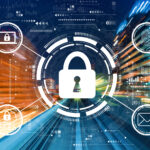Our Approach to Securing Information for Individuals and Clients.
October is National Cyber Security Awareness Month, and in honor of that, we wanted to share some insight on how we protect and secure our information from cyber threats. We spoke with Synergy’s Global Information Security and Infrastructure Officer, Mitch Christian, for his perspective on Synergy’s best practices, as well as his recommended tips and tricks, to protect confidential information online.
Q: Why is it important for Synergy to protect our information?
A: Protecting our information is paramount for Synergy because it safeguards our reputation, operational integrity, and the trust of our clients and partners. For key clients, we enter into numerous Data Processing Agreements (DPAs). Safeguarding client information is not just a duty; a breach could devastate our reputation and position in the market. Our investment in top-tier security serves as a unique market differentiator, distinguishing us in our industry. Guiding our efforts is a dedicated team boasting over 30 years of IT expertise and 15 years in security.
Q: What specific practices do we put in place to protect information?

A: We run everything off a cloud-based backend system, and all our technology is interconnected within that. They have heavy controls and layers of protection put in place to help control any threats. We’re also partnered with Wizard Cyber, and they investigate any suspicious activity through our systems. October is, as we know, National Cyber Security Month, and every year during this time we actively share tips and tricks with the Synergy staff. As our team grows, we want to ensure each is properly trained on how to protect both individual and corporate information. We purchased a rigorous training platform that is required for all employees.
A: We’ve implemented passwordless logins to enhance security. Given that passwords are a leading vulnerability for breaches, we’ve transitioned to using biometrics and Multi-Factor Authentication (MFA). Our objective is to completely eliminate the need for passwords. For privileged access, like admin roles, we’ve instituted advanced secure login measures to safeguard both our and our client’s data.
Q: What are basic tips for someone who does not understand how to be safe and secure while navigating the internet?

A: Number one – change your password A LOT. Do not use the same password for every account or platform. Make a unique password so that someone is not able to learn one password and hack all of your accounts. Pay close attention to who is sending you emails and information. At the end of the day, it all comes down to education and intuition. Be informed. If it doesn’t feel right based on the information you are given, go with that feeling. Many incidents that I have dealt with start with the person having a gut warning that something feels strange. In the same way that you are on guard when you are walking in an unfamiliar area, you should be on guard while searching the web and remain on high alert.
Q: Many phishing attempts include highly believable links. How can people assess the legitimacy of what is being sent to them?
A: Many email platforms feature built-in spam identification tools. At Synergy, we’ve implemented our own sophisticated layers for spam assessment. If any suspicious activity is detected through our email system, it should be promptly reported as phishing. Always prioritize safety: if something seems off, don’t dismiss it. One practical tip is to use link previews by hovering over a link; this helps determine the destination webpage and its legitimacy.
Tips for Staying Safe on the Internet:
– Use long, unique passwords
A strong password is typically at least 12 characters long. A complex password helps to secure your accounts and take the easy guessing out of a log-in.
– Enable multi-factor authentication
Using multi-factor authentication (a unique one-time code or biometrics) can decrease the risk of being hacked by creating multiple layers to access an account.
– Think before clicking
Internet threats will create believable and enticing links often offering an exclusive deal to convince Internet users to click. Make sure to verify all links by hovering over them with your cursor to preview the link destination.
– Maintain a clean machine
Make sure that all software installed on the technology you are using is current and updated to reduce your risk of cyber infection.
– Always be alert
Cyber security is a living, breathing thing that changes every day! There are always new attacks and ways to steal information. It’s a scary world out there but following these cyber safety measures will help you feel more secure as you surf the web.
So Why Is Cyber Security So Important to the Hospitality Industry?

In an ever-evolving landscape of threats, Synergy’s systems notably thwarted 3.2 billion security events just last month. As a leading corporate housing provider, cybersecurity is indispensable to us. The nature of our business means we manage a significant volume of personal and financial details daily. When clients reserve our fully furnished apartments, they entrust us with personal details. Ensuring the safety of this information is paramount, not just for the protection of data but also to uphold our industry reputation. This commitment to security earns the trust of numerous Fortune 500 companies and individual travelers alike. To maintain and fortify this trust, our team persistently explores advanced software and technology solutions to bolster our data security.






